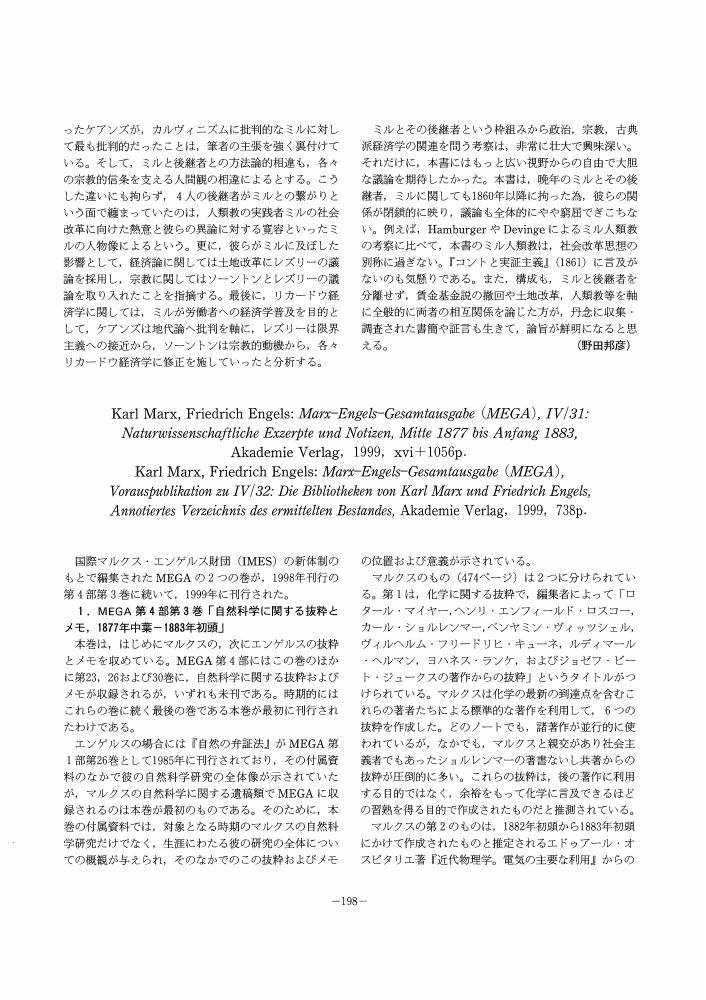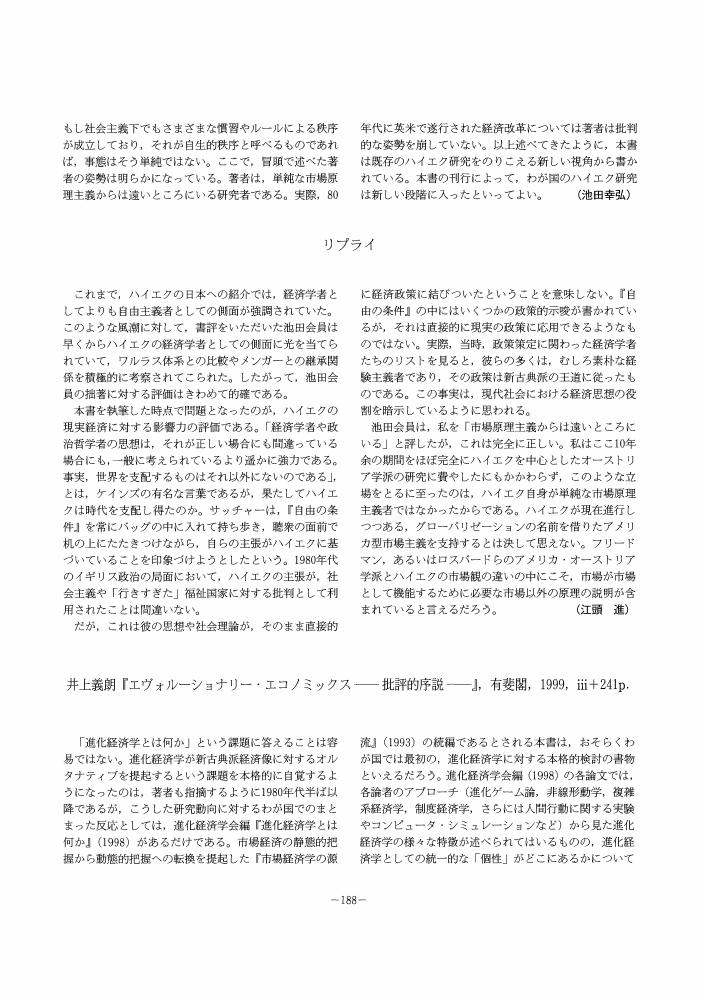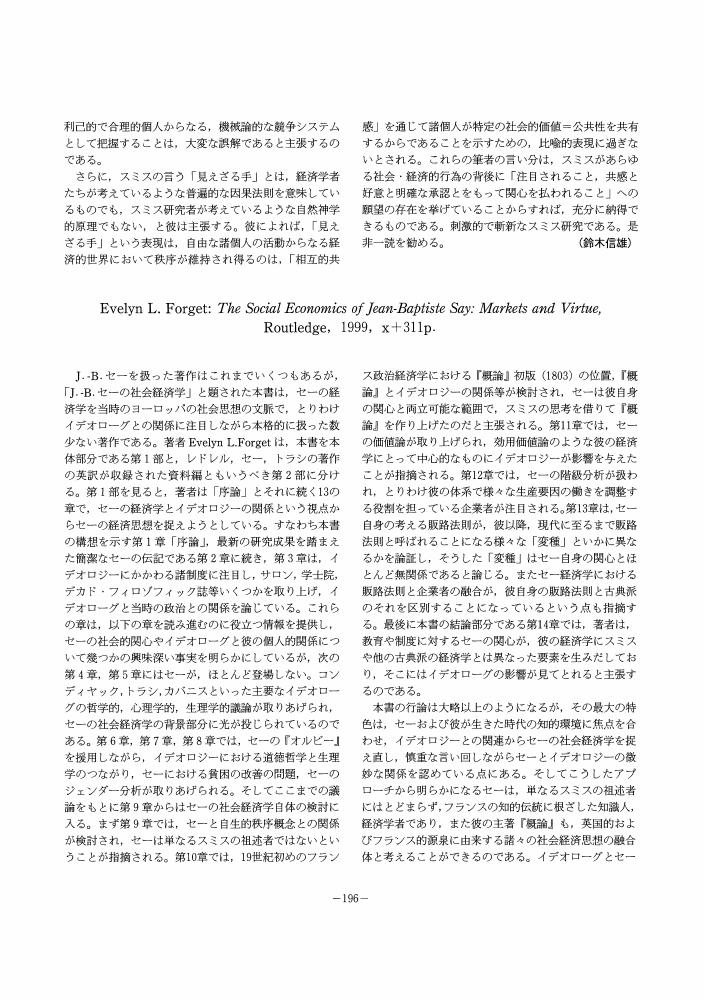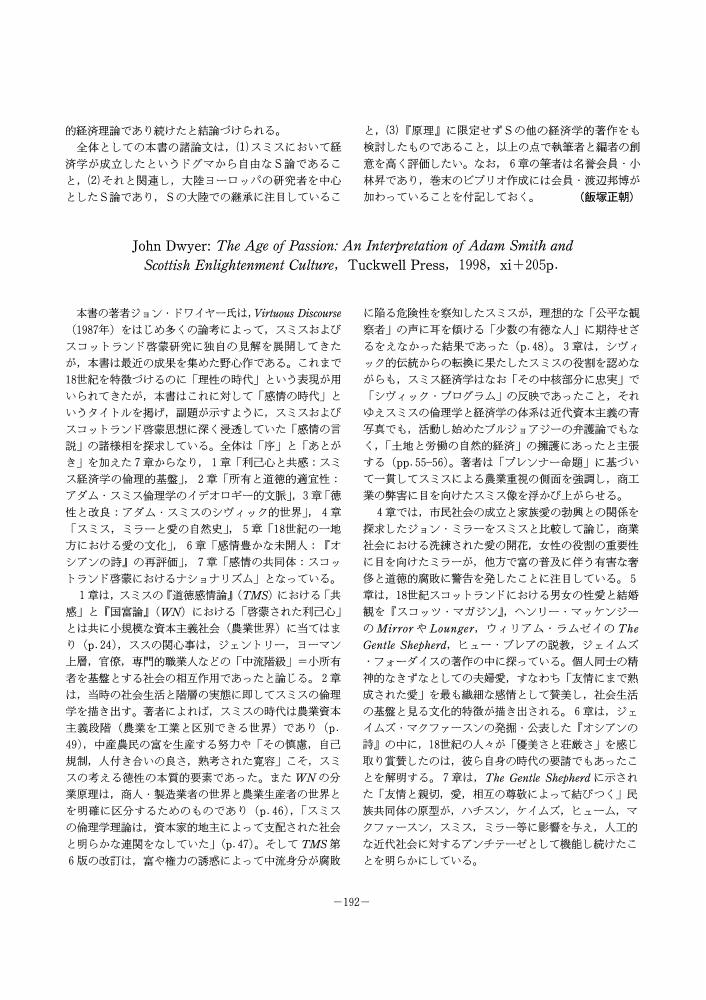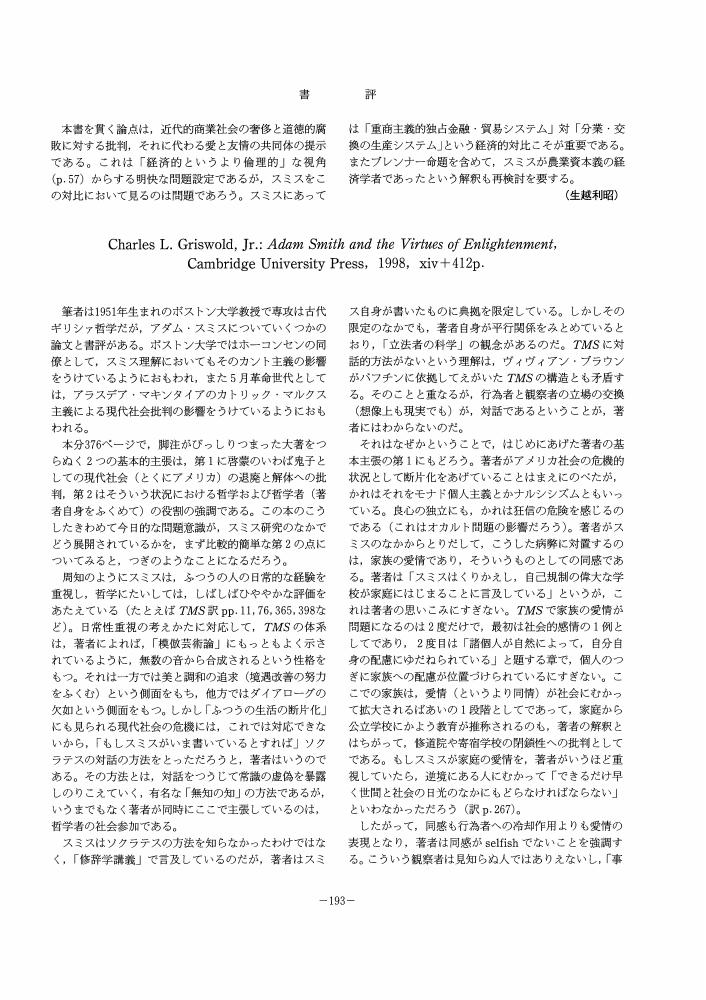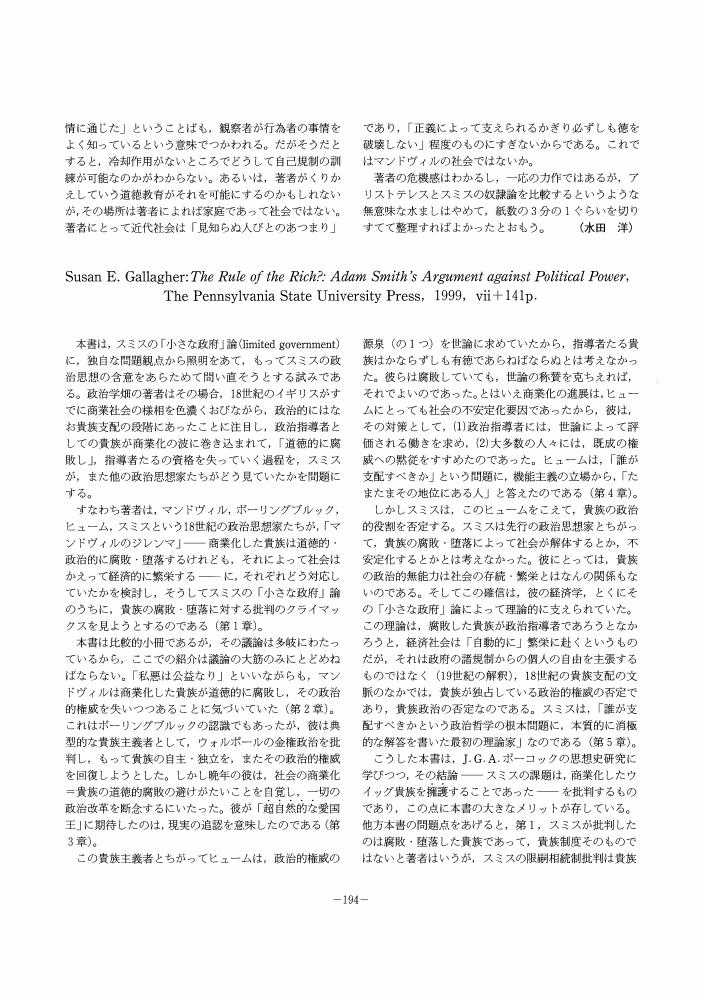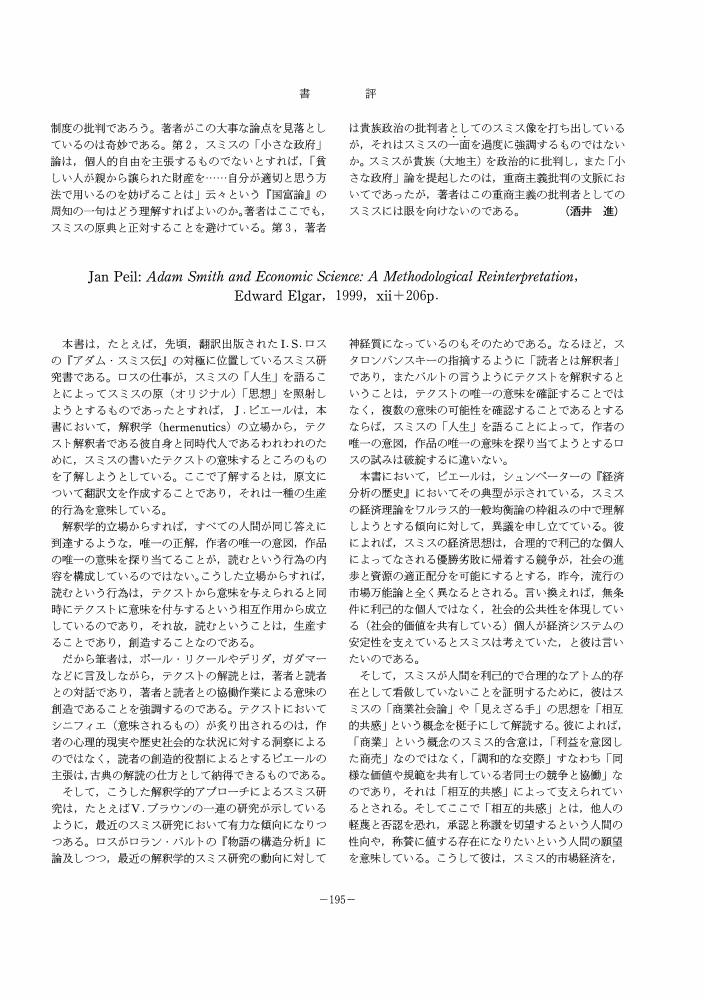1 0 0 0 OA アダム・スミス研究の現状と将来
- 著者
- 星野 彰男
- 出版者
- The Japanese Society for the History of Economic Thought
- 雑誌
- 経済学史学会年報 (ISSN:04534786)
- 巻号頁・発行日
- vol.39, no.39, pp.28-34, 2001 (Released:2010-08-05)
- 参考文献数
- 41
The viewpoint that the ideas described The Wealth of Nations is consistent with the labor theory of value has been rejected by all the schools of economics except for a few Japanese in the 1940's, who called Smith's thought a civil society idea. Afterwards, Y. Uchida and N. Kobayashi disputed this idea, but overlooked the point that Smith's commercial society was devoid of capital-stock. If this is the case, his labor theory of value in that society can be taken as an abstraction from his capitalist society. All the studies of his value theory as well as Marx's have missed this. Smith's added-value theory is applied to the theory of productive labor and the employment of capital, and so his criticism of the mercantile system.Theory of Moral Sentiments is taken not only as a passion theory but as an action theory. Although we can see the relation between both works, the overseas Adam Smith Rennaissance since 1976 disregards these viewpoints. But lately D. Winch and J. M. Buchanan have noted Smith's productive labor, thus his value theory may be reestimated, at which time the actual Adam Smith Rennaissance will start. In the case of Japanese studies on Smith, the civil society idea has long been accepted, but now its revision is needed because for the above reasons.
1 0 0 0 OA J. ステュアート研究の成果と展望
- 著者
- 竹本 洋
- 出版者
- The Japanese Society for the History of Economic Thought
- 雑誌
- 経済学史学会年報 (ISSN:04534786)
- 巻号頁・発行日
- vol.39, no.39, pp.3-10, 2001 (Released:2010-08-05)
- 参考文献数
- 15
The popular belief that Adam Smith was the first founder of political economy is correct in part. He is certainly an ancestor of classical, neo-classical, and Marxist economics. We, nevertheless, assert that Sir James Steuart is an alternative to Smith, and thus is one of the first political economists. He created the primitive equilibrium theory and a system of monetary theory. Although Steuart and Smith formed contrasting economics, they constituted a common system of political economy in relation to political and social affairs. In this, they were the institutional economists. We should in particular evaluate this aspect of Principles' monetary theory.
1 0 0 0 OA スコットランド啓蒙研究の学史的可能性
- 著者
- 田中 秀夫
- 出版者
- The Japanese Society for the History of Economic Thought
- 雑誌
- 経済学史学会年報 (ISSN:04534786)
- 巻号頁・発行日
- vol.39, no.39, pp.11-19, 2001 (Released:2010-08-05)
- 参考文献数
- 52
The study of the Scottish Enlightenment began in the west in the 1960s. One of the most influential works produced in this field was Wealth and Virtue (1983), which has been read with great interest in Japan. Forbes and Pocock are two great masters in this field of study, but the former is less influential due to his restricted interest than the latter whose interests lie in various topics and studies such as Civic Humanism, British Historiography, and the history of political thought. Under their influence, the natural law tradition and civic humanist ideas and their interrelation have been closely studied by many scholars, and their trends and characteristics are reviewed in this essay, whose aim is to reconsider the possibility of the Scottish Enlightenment for the formation of the political economy. Therefore, by viewing many works concerning the Scottish Enlightenment, the formation of Britishness, the British Nation, the British Empire, and many other topics in the fields of history and the history of ideas, this paper reconsiders some new possibilities in the field of History of Political Economy which will be found out by responding to such many new studies.
1 0 0 0 OA 序言経済学史学界と学会との前進のために
- 著者
- 竹本 洋
- 出版者
- The Japanese Society for the History of Economic Thought
- 雑誌
- 経済学史学会年報 (ISSN:04534786)
- 巻号頁・発行日
- vol.39, no.39, pp.1-2, 2001 (Released:2010-08-05)
The Annals of the Japanese Society for the History of Economic Thought has been issued annually since 1963, but with the first year of the 21st century it has changed to a biannual bulletin. Furthermore, we newly constituted the international advisory board for the editorial committee, and appointed Mark Blaug, A. W. Coats, Samuel Hollander, Laurence S. Moss, Bertram Schefold, Warren Samuels, and John Vint as our advisers. With these changes, our society will continue its efforts towards furthering the study of the history of economic thought.
- 著者
- 野田 邦彦
- 出版者
- The Japanese Society for the History of Economic Thought
- 雑誌
- 経済学史学会年報 (ISSN:04534786)
- 巻号頁・発行日
- vol.38, no.38, pp.197-198, 2000 (Released:2010-08-05)
- 著者
- 大谷 禎之介
- 出版者
- The Japanese Society for the History of Economic Thought
- 雑誌
- 経済学史学会年報 (ISSN:04534786)
- 巻号頁・発行日
- vol.38, no.38, pp.198-199, 2000 (Released:2010-08-05)
- 著者
- 若森 章孝
- 出版者
- The Japanese Society for the History of Economic Thought
- 雑誌
- 経済学史学会年報 (ISSN:04534786)
- 巻号頁・発行日
- vol.38, no.38, pp.200-201, 2000 (Released:2010-08-05)
- 著者
- 若田部 昌澄
- 出版者
- The Japanese Society for the History of Economic Thought
- 雑誌
- 経済学史学会年報 (ISSN:04534786)
- 巻号頁・発行日
- vol.38, no.38, pp.201-202, 2000 (Released:2010-08-05)
- 著者
- 塘 茂樹
- 出版者
- The Japanese Society for the History of Economic Thought
- 雑誌
- 経済学史学会年報 (ISSN:04534786)
- 巻号頁・発行日
- vol.38, no.38, pp.202-203, 2000 (Released:2010-08-05)
- 著者
- 高 哲男
- 出版者
- The Japanese Society for the History of Economic Thought
- 雑誌
- 経済学史学会年報 (ISSN:04534786)
- 巻号頁・発行日
- vol.38, no.38, pp.203-204, 2000 (Released:2010-08-05)
- 著者
- 佐藤 隆三
- 出版者
- The Japanese Society for the History of Economic Thought
- 雑誌
- 経済学史学会年報 (ISSN:04534786)
- 巻号頁・発行日
- vol.38, no.38, pp.204-205, 2000 (Released:2010-08-05)
- 著者
- 八木 紀一郎
- 出版者
- The Japanese Society for the History of Economic Thought
- 雑誌
- 経済学史学会年報 (ISSN:04534786)
- 巻号頁・発行日
- vol.38, no.38, pp.205-206, 2000 (Released:2010-08-05)
- 出版者
- 経済学史学会
- 雑誌
- 経済学史学会年報 (ISSN:04534786)
- 巻号頁・発行日
- vol.38, no.38, pp.188-190, 2000 (Released:2010-08-05)
- 出版者
- 経済学史学会
- 雑誌
- 経済学史学会年報 (ISSN:04534786)
- 巻号頁・発行日
- vol.38, no.38, pp.184-186, 2000 (Released:2010-08-05)
- 著者
- 喜多 見洋
- 出版者
- The Japanese Society for the History of Economic Thought
- 雑誌
- 経済学史学会年報 (ISSN:04534786)
- 巻号頁・発行日
- vol.38, no.38, pp.196-197, 2000 (Released:2010-08-05)
- 著者
- 飯塚 正朝
- 出版者
- The Japanese Society for the History of Economic Thought
- 雑誌
- 経済学史学会年報 (ISSN:04534786)
- 巻号頁・発行日
- vol.38, no.38, pp.191-192, 2000 (Released:2010-08-05)
- 著者
- 生越 利昭
- 出版者
- The Japanese Society for the History of Economic Thought
- 雑誌
- 経済学史学会年報 (ISSN:04534786)
- 巻号頁・発行日
- vol.38, no.38, pp.192-193, 2000 (Released:2010-08-05)
- 著者
- 水田 洋
- 出版者
- The Japanese Society for the History of Economic Thought
- 雑誌
- 経済学史学会年報 (ISSN:04534786)
- 巻号頁・発行日
- vol.38, no.38, pp.193-194, 2000 (Released:2010-08-05)
- 著者
- 酒井 進
- 出版者
- The Japanese Society for the History of Economic Thought
- 雑誌
- 経済学史学会年報 (ISSN:04534786)
- 巻号頁・発行日
- vol.38, no.38, pp.194-195, 2000 (Released:2010-08-05)
- 著者
- 鈴木 信雄
- 出版者
- The Japanese Society for the History of Economic Thought
- 雑誌
- 経済学史学会年報 (ISSN:04534786)
- 巻号頁・発行日
- vol.38, no.38, pp.195-196, 2000 (Released:2010-08-05)

